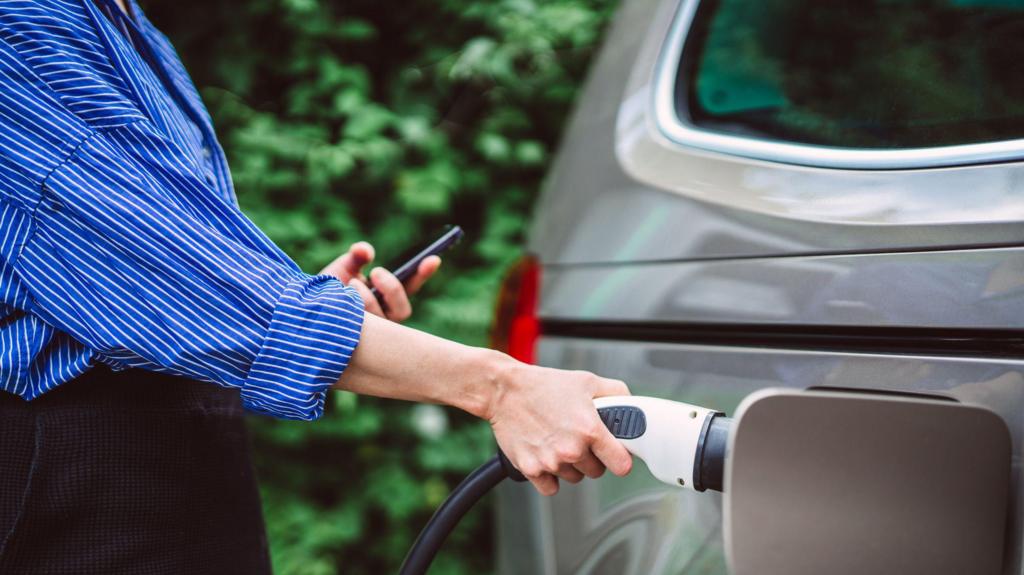The government is anticipated to unveil an additional £1.3bn in funding for the Electric Car Grant scheme at next week’s Budget, aiming to bolster the adoption of electric vehicles (EVs).
Launched in July as part of a broader push towards zero-emission vehicles, the government reports that the Electric Car Grant scheme has facilitated the transition to EVs for approximately 35,000 individuals.
However, preliminary research indicates that the scheme may not be attracting entirely new entrants to the EV market.
In addition to the grant, funding will be allocated to expand the charging infrastructure, and a consultation will address charging solutions for individuals without private driveways.
Conversely, EV owners may potentially face a new tax in Wednesday’s Budget, potentially in the form of a pay-per-mile charge in the future.
As part of the UK’s environmental strategy, the sale of new petrol and diesel cars will be prohibited from 2030, mandating that all new vehicles be electric or hybrid.
The Electric Car Grant, which offers a discount of up to £3,750 on eligible EVs, was initially launched with a fund of £650m.
According to a recent study by New AutoMotive, a non-profit organization promoting the adoption of EVs in the UK, there is limited evidence that the scheme has expanded the EV market.
New AutoMotive reported that EVs covered by the scheme accounted for 23.8% of new registrations in September, mirroring their market share before the Electric Car Grant was introduced.
“It isn’t yet clear that it’s prompting consumers to consider buying cars that they wouldn’t have gone ahead and bought anyway,” noted David Farrar, policy manager for New AutoMotive.
The Budget is also expected to allocate an additional £200m to expedite the deployment of chargepoints across the UK.
Zapmap data indicates that there are currently almost 87,000 chargepoints at approximately 44,000 locations throughout the UK, including supermarket parking lots and lamppost chargers.
According to the government, “The proposed funding will support the creation of thousands of chargepoints and provide extra resources for local authorities to ramp up charging infrastructure on local streets – making it easier for everyone to access reliable charging, including those without off-street parking.”
The government added that Chancellor Rachel Reeves “is expected to publish a consultation on Permitted Development Rights to make it easier and cheaper for people without a driveway to charge”.
Nonetheless, EV owners may face a new tax within the Budget, potentially through a pay-per-mile charge starting in 2028.
A government spokesperson told the BBC earlier this month: “Fuel duty covers petrol and diesel, but there’s no equivalent for electric vehicles. We want a fairer system for all drivers.”
Reeves is facing pressure not to raise taxes on drivers, with campaigners preparing to deliver a petition to Downing Street early next week, calling for the long-frozen fuel duty not to be increased.
Richard Holden, Shadow Transport Secretary, has described the plan to offer “handing out £1.5 billion in EV subsidies while hard-working taxpayers are squeezed dry” was “madness”.
“Ordinary families are facing increased taxes and spiralling inflation under Labour, yet the Government’s priority is handing out discounts on new electric cars,” the Conservative MP said.
Reeves is anticipated to increase some taxes in the Budget to reduce NHS waiting lists, the national debt, and the cost of living.
Regulated fares, which include season tickets and off-peak returns, will not see annual price rises for the first time in 30 years, the government announces.
Countries have reached a new deal to tackle climate change – but not everyone is happy.
The chancellor faces her toughest challenge yet in a Budget that will define the government’s future, writes Laura Kuenssberg.
Some 43,000 drivers use Hindhead Tunnel each day – but who are the people keeping them safe?
The owner of a Hammersmith pub fears closure if the chancellor raises taxes in the upcoming Budget.

